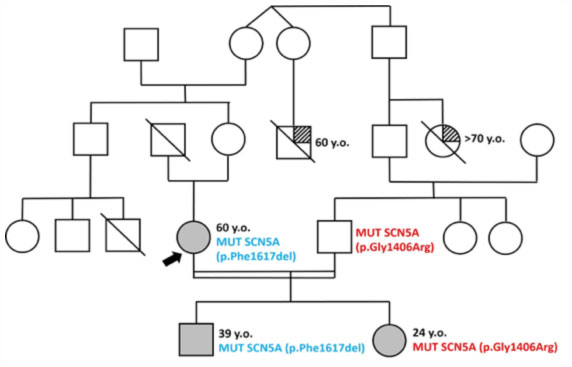How the Cardiogenetic Service works
The activity of our Cardiogenetics Service includes three phases: pre-test consultation, molecular genetic analysis, and post-test consultation. Genetic tests are performed on both adults and children.
The pre-test consultation is used to build the family tree (Figure 1), to collect the clinical information that will guide the execution of the analysis, to illustrate its limits and to acquire the patient’s (defined as “proband” ) informed written consent.

Figure 1: Family tree of a family in which a form of Brugada segregates
Molecular genetic analysis is performed by taking a peripheral blood sample, from which the patient’s DNA will be extracted. The test uses the latest methods (“Next Generation Sequencing”, NGS) to analyze the patient’s DNA, leading to confirmation or exclusion of the clinical suspicion. Before proceeding with the genetic test, the Cardiogenetics team selects the DNA regions to be studied, choosing those which, according to the most recent literature, are associated with the suspected condition.
Once the results of the genetic test are available, the clinical and genetic data are re-evaluated in detail and the Cardiogenetics Service contacts the patient for post-test advice, during which the result of the genetic test is communicated to the patient. The delivery of the report takes place exclusively in the context of post-test consultation.
- In the event of a positive test (i.e. verification of the causative mutation), the extension of the analysis to the patient’s 1st degree family members (parents, siblings, any children) is planned if possible, after obtaining the informed consent of each of family members.
- In the event of a negative test (i.e. no causative mutation emerged), the most suitable path for each patient is established.
Following the post-test consultation, which provides for the explanation of the report by specialists (Geneticist and Cardiologist), there is the possibility of carrying out a psychological consultation, with a dedicated team. (Psychology Service >>)
In fact, the most recent results of international literature show that awareness of being a carrier of a genetic disease has a significant impact on the patient’s life, and in particular that the very idea of “disease risk” can undermine the patient’s psychological balance. To prevent this from having negative consequences on a patient’s health (physical and mental), it is therefore important that the patient is supported, if necessary, by a psychologist.
